If you’re in the market for a top-notch education with adventure opportunities and an outdoorsy setting, we’ve lined up the best-situated schools in the Southeast and Mid-Atlantic for those times when you simply need to ditch the books and #gooutsideandplay.
Warren Wilson College, Swannanoa, N.C.
Student Body: 893
Public/Private: Private
Outdoor-related degree(s): Outdoor Leadership (BA and minor)
Tuition: $33,260
Academics, work, and service. Those are the pillars, or the Triad, of Warren Wilson College, a small private school nestled in the forested mountains outside of Asheville, N.C. While the Triad largely dictates each student’s time at Warren Wilson, so, too, does the college’s environmental ethos and pledge of sustainability. Students here are encouraged to connect with the natural world. There’s a 275-acre working farm, a 625-acre forest with over 25 miles of trails, and the quiet banks of the Swannanoa River, all of which is open and accessible to the school. The campus itself hosts nearly 10,000 trees, making it one of only 254 college campuses across the country recognized as a “Tree Campus USA” by The Arbor Day Foundation.

“The campus has all that western North Carolina has to offer,” adds Dr. Marty O’Keefe, Chair of the Outdoor Leadership Department at Warren Wilson. “Mountains, rivers, hiking, paddling, and biking opportunities, and a multitude of organizations that use the outdoors for educational, therapeutic, and recreational means.”
Warren Wilson also has its own climbing wall and challenge course. Within a 15-minute drive, students can be on the nearby Kitsuma and Heartbreak Ridge trails for classic western North Carolina riding. Another 15 minutes farther grants them access to Bent Creek Experimental Forest and the French Broad River in Asheville. Expand that radius to 90 miles and you have Pisgah National Forest, DuPont State Forest, Linville Gorge Wilderness, and the ski hills at Beech, Sugar, Wolf Laurel, and Cataloochee. It’s the perfect setting, and the perfect recipe, for getting your weekend (and weekday) adventure fix.
Appalachian State University, Boone, N.C.
Student Body: 17,932
Public/Private: Public
Outdoor-related degree(s): Hospitality and Tourism Management (BS/BA), Recreation Management (BS and minor) with a concentration in Commercial Recreation and Tourism Management, Outdoor Experiential Education, or Recreation and Park Management
Tuition: $7,416 (in-state) $21,932 (out-of-state)
Most students who come to App State know what they’re signing up for. Surrounded by rolling ridgelines and densely wooded forests, App State’s campus is at the heart of North Carolina’s High Country. Grandfather Mountain towers in the distance. The Blue Ridge Parkway weaves along the horizon. Rivers like the Watauga and New spring to life from their forested wombs. Interest in the outdoors, even if you’re just an artist drawing on the mountains for inspiration, is mandatory if you want to be a Mountaineer.
“Boone is nestled in a unique area of North Carolina where summers are cool and winters cold, therefore providing students the opportunities to embrace four seasons and their specific adventures,” says Outdoor Programs Coordinator Andrew Hawley.
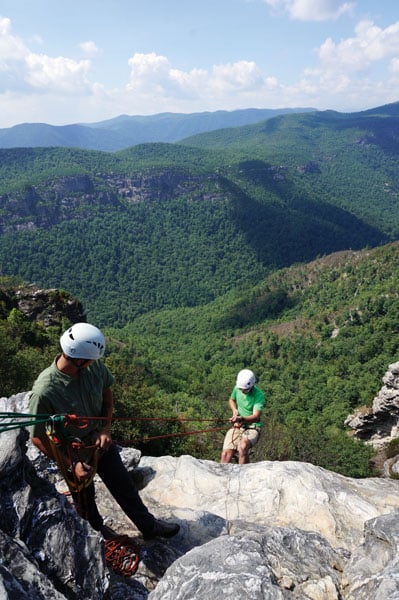
With three ski resorts (Beech Mountain, Sugar Mountain, and Appalachian Ski Mountain), Rocky Knob Bike Park, and thousands of acres of protected land less than an hour’s drive away, (including, but not limited to, Linville Gorge Wilderness and Pisgah National Forest) students certainly have the resources to take advantage of those four seasons. And with for-credit opportunities to journey beyond the Blue Ridge to the Grand Tetons, Canadian Rockies, and this winter, the headwaters of the Amazon River, App State can satisfy just about any appetite for adventure. But according to Hawley, the allure of this Blue Ridge university is more than just the destinations—it’s the people, too.
“The campus also draws highly respected professors in geology, environmental science, sustainability, recreation management, and other disciplines that inspire our students to seek out and explore our wilderness areas,” he says. “App State’s campus is unique in that it naturally radiates its own outdoor identity through the students, staff, and mission.”
Washington and Lee University, Lexington, Va.
Student Body: 2,264
Public/Private: Private
Outdoor-related degree(s): N/A
Tuition: $47,280
Cradled between the George Washington and Jefferson National Forests to the east and the Central Blue Ridge Mountains to the west, the city of Lexington, Va., hosts a wealth of natural beauty and history. Established in 1778, the town has long held a reputation for its dedication to education—Washington and Lee (W&L) was founded in 1790 and its neighbor campus the Virginia Military Institute enrolled its first students in 1893—but according to W&L Director of Student Activities and Outdoor Education James Dick, the city should be more widely regarded as an outdoor destination.
“No one else is out there,” he says. “It is empty and is accessible 12 months of the year.”
Within a half-hour’s drive of Lexington’s business corridor, there are caves and natural bridges, steep creeks and placid rivers, warm and cold water streams. With regional icons like the Blue Ridge Parkway, Appalachian Trail, and Goshen Pass Natural Area Preserve, the area’s diversity is an ideal setting for adventure outings. The W&L campus itself has its own eight-mile trail system, complete with a Henry David Thoreau-style timber-framed cabin for students wanting to disconnect and seek solace with nature’s simplicity.
“It’s meant to encourage current students to tune out,” Dick says. “No running water…no electronics allowed, it’s single person use. [The cabin] is an ideal mental break and recharge space.”
Among the W&L Outing Club’s offerings are a five-night backpacking pre-orientation trip on the Appalachian Trail, Appalachian Adventures, a sea kayaking trip to Florida’s 10,000 Islands, and a student-led and self-supported bike tour on the 185-mile C&O Canal.
Ferrum College, Ferrum, Va.
Student Body: 1,500
Public/Private: Private
Outdoor-related degree(s): Recreation Leadership (BS and minor), Outdoor Recreation (minor), Ecotourism (minor)
Tuition: $29,680
Ferrum College’s rural setting in southwestern Virginia inevitably lends itself to an abundance of natural and recreational resources. The 600-acre campus houses three miles of hiking and mountain biking trails, with plans in the works for more, as well as an 18-hole disc golf course, a climbing tower, a lake, and a low and high ropes course. Not far from campus is the DeHart Botanical Gardens, a nature preserve gifted to the college where students can explore four miles of trails, soak in the expansive mountain views, and learn more about the preserve’s diverse population of plant and animal species. Not bad for a small school, says Aaron Conover, Director of Ferrum Outdoors, and the going only gets better the more you delve beyond Ferrum.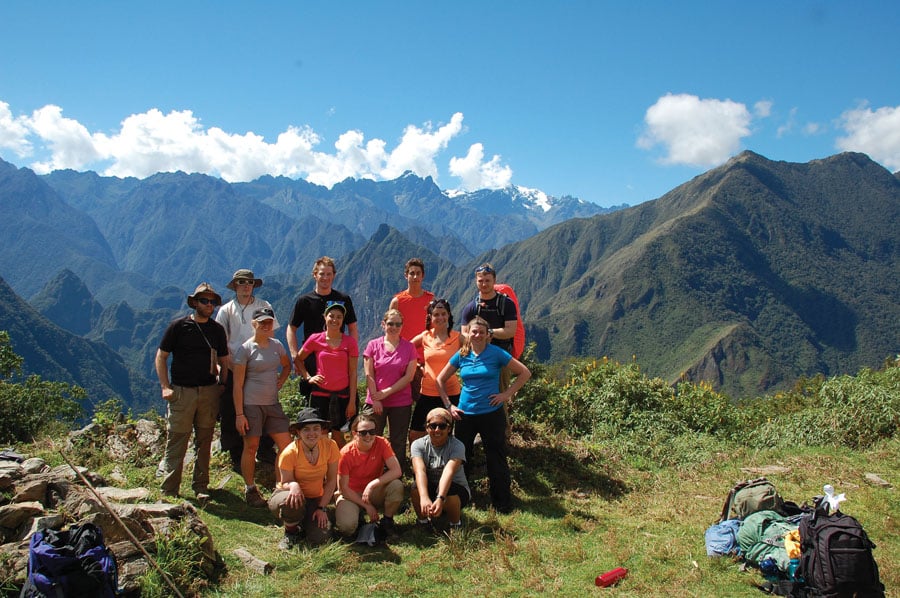 “Just a short distance from campus, Philpott Lake and Fairy Stone State Park offer canoeing and kayaking, mountain biking, hiking and camping, as well as some of the best fishing and hunting in the state,” Conover says. “Close by, the Franklin County Blueway system has eight access points between the Blackwater and Pigg Rivers.”
“Just a short distance from campus, Philpott Lake and Fairy Stone State Park offer canoeing and kayaking, mountain biking, hiking and camping, as well as some of the best fishing and hunting in the state,” Conover says. “Close by, the Franklin County Blueway system has eight access points between the Blackwater and Pigg Rivers.”
And the list keeps growing. The Appalachian Trail, Roanoke, James, Smith, and New Rivers, Blue Ridge Parkway, Jefferson National Forest, Carvins Cove Nature Reserve, and Smith Mountain Lake are less than 100 miles away from Ferrum’s classrooms. Recreation Leadership majors at Ferrum can even intern with Virginia State Parks as part of the Park Ranger Skills Development Program or with a Santiago-based university to study ecotourism in the Patagonia region.
West Virginia University, Morgantown, W.Va.
Student Body: 31,514
Public/Private: Public
Outdoor-related degree(s): Recreation, Parks, and Tourism Resources (BS, minor, and MS)
Tuition: $6,384 (in-state) $20,184 (out-of-state)
Positioned at the heart of Morgantown, the fourth-largest city in West Virginia, the West Virginia University (WVU) campus maintains a surprisingly natural feel. The Monongahela River runs right through downtown with the greenery of public lands like Coopers Rock State Forest and Little Indian Creek Wildlife Management Area making their mark on an otherwise urban canvas. Through WVU’s Adventure WV, the university is striving to showcase the outdoor amenities that are more than just easily accessible—they are world-class.
“There are 790 navigable rivers in the state,” says Matthew Shreve, Multimedia Specialist and Communications/Marketing Manager for Adventure WV. “Because of that, it’s made West Virginia a whitewater mecca.”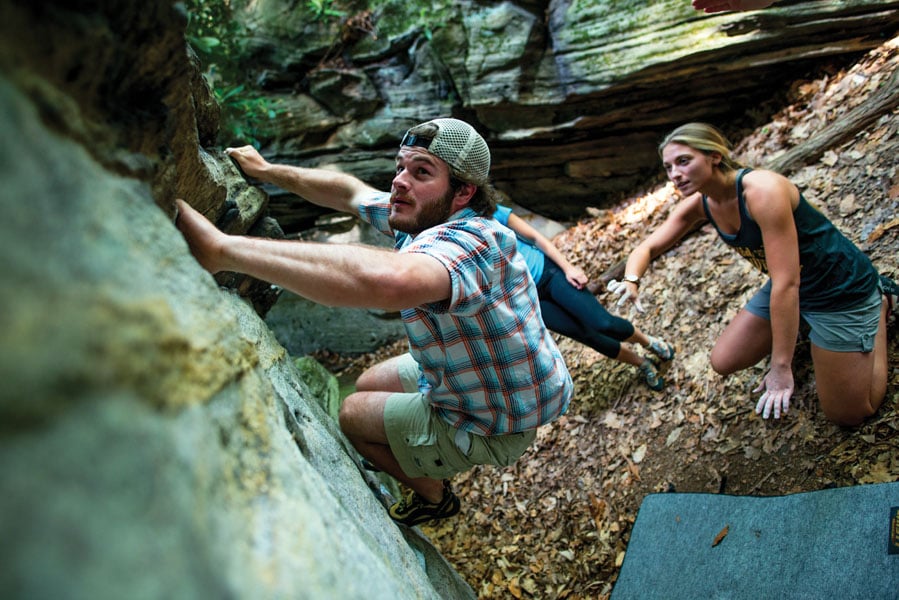 Within an hour’s drive, students can be on the Youghiogheny River in Ohiopyle, Penn., largely considered the birthplace of whitewater in the country, or on the Cheat River in northern West Virginia, an environmental and recreational pearl in the Mid-Atlantic. There’s Tygart Lake, Cheat Lake, Summersville Lake, Deep Creek Lake, all within a similar driving radius, and all with stellar creeks and rivers as tributaries.
Within an hour’s drive, students can be on the Youghiogheny River in Ohiopyle, Penn., largely considered the birthplace of whitewater in the country, or on the Cheat River in northern West Virginia, an environmental and recreational pearl in the Mid-Atlantic. There’s Tygart Lake, Cheat Lake, Summersville Lake, Deep Creek Lake, all within a similar driving radius, and all with stellar creeks and rivers as tributaries.
A little farther south puts you in Fayetteville, W.Va., home to the New River Gorge and nearby Gauley River National Recreation Area. An internationally respected destination for climbers and paddlers alike, the New River Gorge is conveniently located near West Virginia University’s new Institute of Technology campus in Beckley, W.Va., set to have its first students this fall.
“The big point is we’re close to a lot of outdoor resources but they’re not just nice resources—they’re resources that are international destinations,” says Shreve. “West Virginia has been an energy hub for the U.S., and that’s where a lot of its identity and reputation has come from, but people forget just how rich we are in outdoor resources.”
Adventure WV Outdoor Experiences seeks to show upcoming freshmen, in-state and out-of-state alike, just that. From two to seven days, upwards of 1,100 freshmen join Adventure WV’s staff every fall on outdoor excursions throughout the state. From the New River Gorge to Seneca Rocks, Shreve says the goal is to give these students a sense of place.
Berry College, Rome, Ga.
Student Body: 2,245
Public/Private: Private
Outdoor-related degree(s): N/A
Tuition: $33,330
In the northwestern corner of Georgia, the city of Rome is nurturing a vibrant outdoor scene. Brick buildings climb amid a backdrop of Appalachian ridges, its downtown sector made partial by the confluence of three rivers—Coosa, Oostanaula, and Etowah. The coliseum of Rome, Berry College encompasses nearly 27,000 acres of the city, making it the world’s largest contiguous college campus. Even better? That 27,000-acre spread is mostly woodlands, streams, and meadows.
If you’ve ever seen the movies Sweet Home Alabama and Remember the Titans, you’ll likely recognize the campus’ English Gothic architecture with its sweeping archways and manicured lawns. Berry College has consistently ranked high on top 10 lists of the country’s most beautiful colleges by Travel+Leisure, Buzzfeed, and Southern Living, but the campus offers more than a pretty setting in which to study.
“Our many hiking, biking, and horseback trails offer easy to moderate terrain, isolated nature experiences, and beautiful vistas,” says Assistant Director of Recreation at Berry College Amanda Highfield. “Many students choose Berry because of the pristine campus and opportunity for outdoor recreation.”
Included in those 27,000 acres is the 16,000-acre Wildlife Management Area, managed by the Georgia Department of Natural Resources, where students can bike, run, ride horses, play disc golf on two designated courses, overnight camp at the on-campus campsite, and even hunt. The college even has its own bald eagle population, a testament to the unspoiled wilderness students have access to while still being only an hour’s drive from metropolitan hubs like Atlanta and Chattanooga.
Virginia Commonwealth University, Richmond, Va.
Student Body: 31,242
Public/Private: Public
Outdoor-related degree(s): N/A
Tuition: $13,130 (in-state) $32,287 (out-of-state)
At first glance, Virginia Commonwealth University’s (VCU) city setting might deter some nature lovers from even considering this nationally recognized school in the heart of Richmond. But look closer, and you’ll see salty raft guides, gritty climbers, and lean road cyclists, indicative of a resident outdoor species amid the city bustle.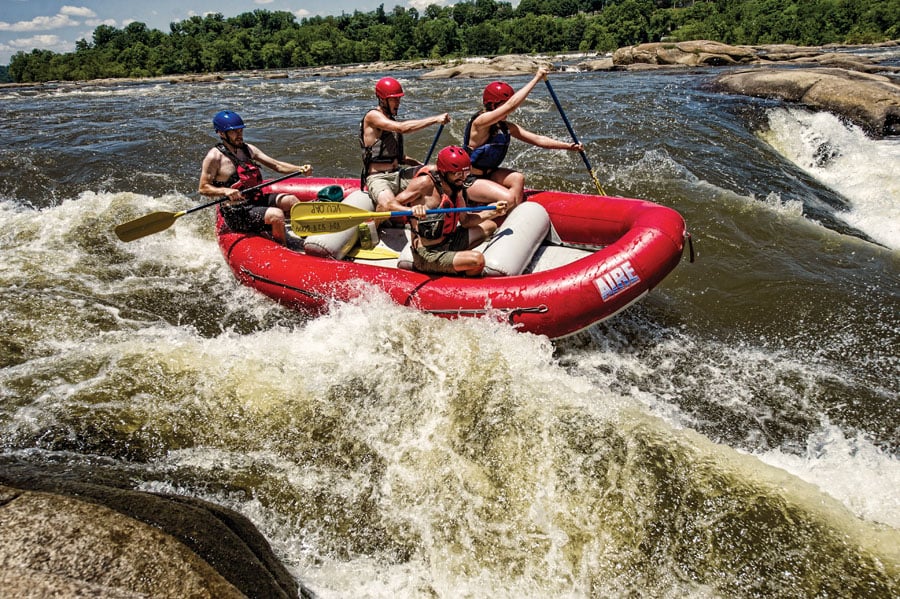 “Being in an urban environment might be a disadvantage for some outdoor programs, but that doesn’t limit the OAP [Outdoor Adventure Programs],” says Joey Parent, VCU’s Assistant Director for Outdoor Adventure Programs. “The James River Park System is our backyard. We have over 20 miles of singletrack trails, class IV whitewater, and [an] outdoor climbing all within a half-mile of campus.”
“Being in an urban environment might be a disadvantage for some outdoor programs, but that doesn’t limit the OAP [Outdoor Adventure Programs],” says Joey Parent, VCU’s Assistant Director for Outdoor Adventure Programs. “The James River Park System is our backyard. We have over 20 miles of singletrack trails, class IV whitewater, and [an] outdoor climbing all within a half-mile of campus.”
Combine that with close proximity to Wintergreen Resort, Shenandoah National Park, George Washington National Forest, the Blue Ridge Parkway, and any number of beaches along the eastern Virginia seaboard, and you’ve got year round access to any type of adventure, whatever the weather.
And while students can join OAP on weekly afternoon trips and clinics or rent gear and venture into the urban wilds on their own, one of the most popular flagship programs of OAP is Footprints on the James, a collaborative, four-week trip along the James River that gives students a biological, historical, and real-world educational experience.
Brevard College, Brevard, N.C.
Student Body: 705
Public/Private: Private
Outdoor-related degree(s): Wilderness Leadership and Experiential Education (BA and minor)
Tuition: $27,550
For a quaint town of 7,500, the residents of Brevard, N.C., most certainly know how to harness their natural assets. More than 50 percent of the land in Transylvania County, of which Brevard is the seat, is covered in public forest. There’s an in-city trail system that connects to Pisgah National Forest, the confluence of the French Broad and Davidson Rivers, and 250 waterfalls right out the front door.
In effect, Brevard serves as the gateway to a world of adventure, from down-the-road destinations like DuPont State Forest and Gorges State Park to Caesar’s Head and Table Rock State Parks in South Carolina. This, says Dr. Jennifer Kafsky, Brevard College (BC) Professor of Wilderness Leadership & Experiential Education (WLEE) and Experiential Education Division Chair, makes Brevard College the epitome of a basecamp for adventure in the Southeast.
“Many college [and] university outdoor programs must travel long distances to their outdoor classrooms,” says Kafsky. “Brevard College is fortunate to be located in Transylvania County which provides a wealth of outdoor opportunities in our own backyard.”
The college has active cycling and climbing teams for those with that competitive edge, while the BC Outing Club and Voice of the Rivers 21-day academic expedition cater to even the most beginner of students. Yet for those who are seriously considering a future career in the outdoors, Brevard’s WLEE program should seriously be considered. Its reputation is well known for providing students with a thorough, hands-on foundation on topics ranging from risk management to recreational therapy. The pinnacle of the WLEE program, the Immersion Semester, requires 10 students to work together on the planning and execution of a 21-day expedition.
“With dedication and commitment both in and outside of our classes, we have had students come in the door with little to no experience and leave as competent instructors in various outdoor adventures,” Kafsky says. “Living and working together in the field for the [Immersion Semester] 21-day trip is a powerful experience. There are learning adventures daily, both planned and unexpected.”
Garrett College, McHenry, Md.
Student Body: 900
Public/Private: Public
Outdoor-related degree(s): Adventure Sports Management (B.S., 2+2 program with Frostburg State University)
Tuition: $2,744 (in-state and in-county) $6,160 (in-state and out-of-county) $7,280 (out-of-state)
For a small, two-year Mid-Atlantic school, the reputation of Garrett College and its surrounding outdoor resources is highly regarded not just domestically, but internationally as well. The Savage River in Garrett County served as the site for the 1989 International Canoe Federation (ICF) Whitewater Canoe and Kayak World Championships as well as the 1992 U.S. Olympic Team Trials in Whitewater Slalom Canoe and Kayak. In 2014, the Adventure Sports Center International, a manmade whitewater course also in Garrett County, was the setting for the ICF Whitewater Canoe and Kayak Slalom World Championships.
Elite-level athletes, especially paddlers, have been coming out of this corner of Maryland for decades, and this, says Garrett College’s Adventure Sports Management Executive Director Michael Logsdon, is just the icing on the cake. Situated within a 200-mile radius of 32 million people yet just minutes away from wild places like Garrett State Forest, Swallow Falls State Park, and the Youghiogheny River, Garrett College’s campus is prime for four-season adventurers.
Less than a mile away is Maryland’s largest freshwater lake, Deep Creek Lake, and the state’s only alpine ski and snowboard area, Wisp Resort. For a recently launched four-year program in Adventure Sports Management (completed in collaboration with Frostburg State University), the setting is picture-perfect.
“Our ability to program on weekdays and avoid crowded weekends and [access] a variety of challenge levels accommodating absolute beginners through highly accomplished participants, helps us greatly in introducing students to a wide variety of outdoor adventure activities,” Logsdon says.
Students in the Adventure Sports Management program are in the classroom some, but the foundation of the major is built upon experiences in the field and lessons that can’t be absorbed from a textbook. During the week, students are often mountain biking or cross-country and telemark skiing in West Virginia’s Canaan Valley, whitewater kayaking on the upper and lower stretches of the Youghiogheny River, or preparing for upcoming trips to destinations like the Catskill Mountains for ice climbing, the Adirondacks for mountaineering, or Cumberland Island for sea kayaking.
New for 2016-2017? Stand-up paddleboarding and a college-wide wilderness orientation program for incoming freshmen. Students interested in the competition side of adventure can also participate in the Adventuresports Institute Competition Team, which placed first at the United States Adventure Racing Association National Championships in 2007 and 2014.
Sewanee: The University of the South, Sewanee, Tenn.
Student Body: 1,793
Public/Private: Private
Outdoor-related degree(s): N/A
Tuition: $35,200
Perched atop the Cumberland Plateau, Sewanee’s campus is mostly known by students and staff as the “Domain.” Its 13,000 acres are crisscrossed by trails, the topography studded with jewel-like lakes. Only 1,000 acres of the property are developed—take a look at Sewanee’s 50-mile mapped trail system and you will likely mistake this university campus for a Tennessee state park.
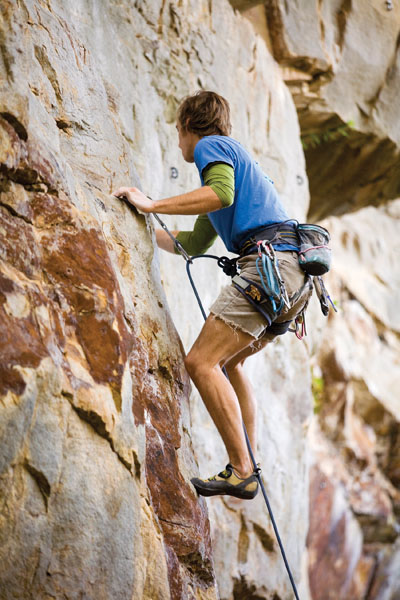
Tracing the property’s boundary is the aptly named Perimeter Trial, a 20-mile multipurpose trail where students, and even the public, can ride bikes and horses, hike or run, and even camp (the latter reserved for school-affiliated students, staff, and alumni). The trail traverses massive sandstone bluff lines, leads to stunning overlooks of the surrounding plateau and lakes, and accesses the campus caving system and climbing crag.
That’s right. Sewanee has its own caves, 10 of them, to be exact. Thanks to the campus’ proximity to the cave-laden Tennessee-Alabama-Georgia (TAG) region, hundreds more are just a short drive away. For climbers, the Domain houses 15 miles of cliff line with mostly top-rope routes, though there are several sport and trad lines amongst Sewanee’s 50+ established routes. After learning the basics of climbing, students can then take their skills to the impressive Obed, Foster Falls, and Stone Fort climbing areas nearby.
Cyclists can ride straight from the dorm onto the trail system or around the area’s well-graded paved roads. The school’s biking opportunities, both in competition and adventure, have long rivaled other schools’ in scope. For nearly a decade straight, Sewanee has annually hosted a 150-mile, two-day ride to raise money for multiple sclerosis research. Additionally, students can take part in the annual 444-mile, five-day Tour de Natchez Trace from Nashville to Natchez, Miss., or a weeklong spring break in the singletrack paradises of Fruita, Colo., and Moab, Utah.
Though the school doesn’t offer any formal outdoor degree, the Sewanee Outing Program’s student trip leaders leave the school well versed in the way of safe, competent backcountry living and leadership.
BRACKET CHAMPS
These schools ranked among the best in this year’s Top Adventure College Contest. See what makes these outdoor schools the best in the region from the students and staff.
#1. Western Carolina University (WCU), Cullowhee, N.C.
Student Body: 10,340
Public/Private: Public
Outdoor-related degree(s): Parks and Recreation Management (BS and minor), Recreational Therapy (BS and minor)
Tuition: $4,624.50 (in-state) $9,821 (out-of-state)
Search Western Carolina University on any map and you’ll immediately see why this mid-size school has won our Top Adventure College Contest three years in a row. Public lands engulf the rural campus—there’s Great Smoky Mountains National Park to the north, Pisgah National Forest to the east, the Nantahala National Forest a bit farther to the south. The Tuckasegee River bisects the quiet town of Cullowhee, just a few steps from WCU’s doors. On campus, WCU manages a seven-mile multi-use trail system, a series of “fix-it” stands for bike repair, a climbing wall, and gear rental shop.
But location aside, WCU’s Base Camp Cullowhee and Parks and Recreation Management (PRM) departments are top-notch. For students with little to no prior outdoor experience, Base Camp Cullowhee provides the opportunities and supportive environment necessary to have fun and stay safe in the woods.
“We have staff that work for us [who] are world class paddlers sponsored by Jackson and students that are travelling all over the country competing, and then we get students who are totally new,” says Jeremiah Haas, Associate Director of Outdoor Programs, of his Base Camp student staff. “That’s where I think Base Camp really excels and we pride ourselves on that, that we meet the needs of those novice level students. We’re taking that student and shaping them into the next generation of outdoor leaders.”
Likely one of the college’s strongest, and most unique, outdoor offerings is the collaborative semester with WCU and Landmark Learning, an outdoor education center that provides trainings and certifications on a wide range of topics. PRM students who enroll in the “Landmark Semester” receive 12 credit hours in addition to a portfolio’s worth of certifications like Wilderness EMT, Leave No Trace Master Educator, and American Canoe Association Canoe and Kayak Instructor.
“We live in an environment where we are surrounded by outdoor opportunities,” Haas says. “We definitely pride ourselves on the fact that you can get outside and actually experience these things instead of just sitting in a classroom and talking about it.”
#2. Emory & Henry College (EHC), Emory, Va.
Student Body: 1,012
Public/Private: Private
Outdoor-related degree(s): N/A
Tuition: $33,500
What started as little more than a weekend hiking group in 1998, the Emory & Henry Outdoor Program is now a full-fledged adventure program with spring and fall break expeditions, a Summer Adventure Program, a women’s specific outing club (Girls Outside), and for-credit classes in everything from whitewater kayaking to climbing, disc golf, and even thru-hiking the Appalachian Trail.
You heard me. Students from Emory & Henry can take an entire semester away from the books and hike the entire Appalachian Trail for school credit. New this year? Students from other colleges can transfer in and receive that same credit at their original institution. For Outdoor Program Director and former thru-hiker Jim Harrison, the goal here is to instill students with a sense of belonging and to teach them the importance of the outdoors without beating them over the head with the facts.
“I am an environmentalist, but I do not preach,” Harrison says. “Through the adventure sports, I try to create meaningful relationships between people and rivers, mountains, and wild places.”
That approach has certainly worked for 20-year-old Charles Wygal, a rising senior and Outdoor Program trip and Summer Adventure Program leader. Wygal’s outdoor adventures didn’t start until coming to Emory & Henry, but since then, he’s acquired a number of high-level certifications including Wilderness First Responder, American Canoe Association Level 3 Kayak Instructor, and Swiftwater Rescue. In the spring of 2015, he and another student co-led the first-ever, student-led spring break sea kayaking expedition to Florida’s 10,000 Islands, a huge responsibility for anyone, let alone a 19-year-old.
Situated at the base of Virginia’s highest peak, Mount Rogers, and surrounded by Grayson Highlands State Park, Jefferson National Forest, and Cherokee National Forest, Emory & Henry’s campus is a Shangri-La of southern Appalachian adventure. Iconic rivers in the region like the Watauga, Nolichucky, New, and French Broad are less than two hours away and the Appalachian Trail might as well run through campus, it’s that close.
#3 University of North Carolina – Asheville (UNCA), Asheville, N.C.
Student Body: 3,900
Public/Private: Public
Outdoor-related degree(s): N/A
Tuition: $19,387 (in-state) $36,882 (out-of-state)
In the uniquely diverse city of Asheville, adventure and culture are one in the same. In a single afternoon, you can be floating on the French Broad River, mountain biking on the trails at Bent Creek Experimental Forest, and back in time for a locally sourced, farm-to-table meal and a night of live music at the Orange Peel. For college students, that ability to have a night on the town Friday and get lost in the woods Saturday makes Asheville a millennial’s paradise.
Just ask Lauren Shell, 19, of Bryson City, N.C. Shell’s a third year at UNCA, and says that balance between adventure and culture was extremely appealing to someone raised in small-town-Appalachia.
“I liked that half-and-half experience here,” she says. “We have the city with the art and the food and the culture, and then you can drive 15 minutes and go ride your bike or paddle or hike.”
UNCA students can, like Shell, learn to be a trip leader through the campus Outdoor Leadership Training Program or train to become a mechanic at the bike shop. “I have seen a huge growth in my decision making skills through working with [Outdoor Programs],” says Shell. “I
very thoroughly assess the pros and cons of my actions and risk versus reward. I’m learning the importance of clear and concise information and how to effectively relay that information to
a diverse audience.”
#4 The University of Tennessee at Chattanooga (UTC), Chattanooga, Tenn.
Student Body: 11,670
Public/Private: Public
Outdoor-related degree(s): N/A
Tuition: $22,456 (in-state) $38,574 (out-of-state)
With the Tennessee River flowing through it and the sandstone cliffs of Lookout, Signal, and Raccoon Mountains towering above, Chattanooga has become a destination for outdoor recreationists of every type. For climber and UTC student Alaina Krakowiak (’18), that accessibility to adventure is precisely what drew her to UTC.
From day one, Krakowiak took advantage of the school’s and city’s offerings—there’s a climbing wall on campus with a separate freestanding boulder, a nearby dock on the Tennessee River where the school hosts standup paddleboarding clinics, a 13-mile out-and-back paved path along the Tennessee River, not to mention a host of weekly outings with UTC Outdoors.
Now, Krakowiak is a trip leader for UTC Outdoors and regularly guides groups of students to the nearby crags at Foster Falls and Little Rock City. She says were it not for the leadership opportunities available through UTC Outdoors, she might not have progressed into the poised climber she is.
“I used to be an incredibly shy person. “[Climbing] has given me confidence and helped me discover a part of me I never knew existed.”
Related Content:








